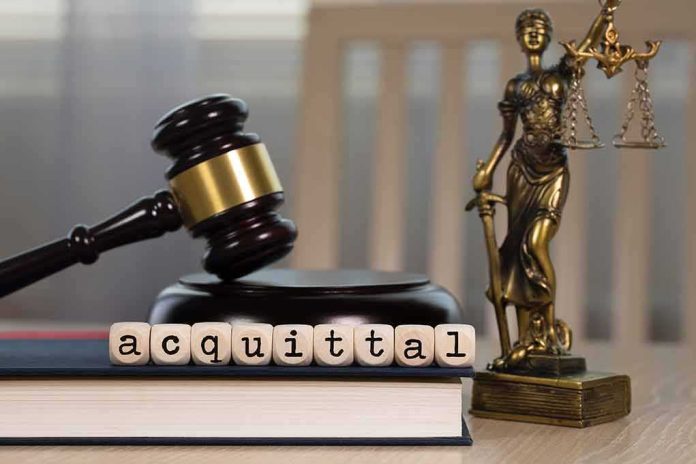
Tommy Robinson’s acquittal on a terror-related charge raises serious questions about the potential misuse of counterterrorism powers for political purposes.
Story Snapshot
- Tommy Robinson was acquitted of charges related to a border stop.
- The court found insufficient evidence for the purported counterterrorism purpose.
- The case has sparked debate over civil liberties and police powers.
- Robinson’s political views were suggested to have influenced the police’s actions.
The Acquittal of Tommy Robinson
In a landmark decision, Tommy Robinson, a controversial activist, was found not guilty of a terror-related offense after refusing to provide police access to his phone during a 2024 border stop. The incident occurred at the Folkston Channel Tunnel, where Robinson, traveling to Spain, was stopped by UK border police. The court ruled that the stop lacked sufficient evidence of a statutory counterterrorism purpose, instead suggesting Robinson’s political views may have unduly influenced the police’s actions.
This verdict has reignited discussions about civil liberties, specifically concerning the use of counterterrorism powers at borders. Under Schedule 7 of the Terrorism Act 2000, UK border officials can stop, question, and search individuals without suspicion. Critics argue these powers are prone to misuse and discrimination, as highlighted by Robinson’s case. His defense emphasized protecting journalistic material and freedom from political targeting, underscoring the delicate balance between national security and individual rights.
Implications for Civil Liberties and Journalism
The ramifications of Robinson’s acquittal extend beyond his personal victory. It highlights potential overreach in policing, particularly regarding activists and journalists. Robinson’s case has bolstered calls for stricter guidelines and oversight on Schedule 7 applications. Many fear that broad discretionary powers can lead to political bias and infringement on civil liberties.
For journalists, this case underscores the critical importance of protecting sources and information. The court’s decision reinforced the notion that journalistic privilege must be safeguarded against unwarranted government intrusion. The outcome serves as a reminder of the ongoing struggle between maintaining security and upholding constitutional rights.
Reactions and Future Considerations
The acquittal has drawn mixed reactions from various sectors. Advocates for civil liberties hail it as a victory, while some law enforcement entities express concern about the impact on counterterrorism efforts. The ruling may prompt legislative reviews of Schedule 7, potentially leading to reforms that better balance security needs with personal freedoms.
The case emphasizes the importance of judicial oversight to prevent the misuse of police powers. As debates continue, it’s crucial to ensure that counterterrorism measures are applied justly, without infringing on individual rights or being swayed by political considerations.




